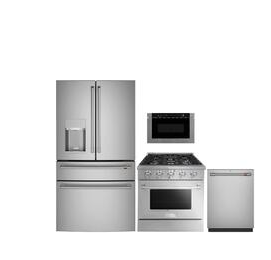How to take care of stainless steel?

It is important to clean stainless steel materials frequently, this practice will prevent the accumulation of lasting stains. Also, it is essential not to use any abrasive or metallic utensils. If we want to wash them thoroughly we can use water from a softener.
The best kitchen utensils are those made of stainless steel, it is a durable and super resistant material. It is among the most used materials, and we can find it in the pan or the knives. This material is perfect for recipes in which high temperatures are necessary.
Among the primary care of stainless steel in the kitchen is the use of Teflon-covered utensils, they are essential for cooking. It should be noted that cooking with stainless steel utensils offers a great advantage for health and is long-lasting.
There is a great doubt regarding the non-stickiness of stainless steel. It could be complicated, but it is very true that it has a non-porous surface unlike other materials. Although not using the pan at the right temperature and with some foods without the correct amount of water or fat, would prevent them from sticking.
It is important that the kitchen pans are made of stainless steel, it shortens the washing time and will make our lives much easier.
WHAT IS STAINLESS STEEL?

It is essential to know that stainless steel is resistant to corrosion, which is why it is used on multiple occasions. Its great resistance to high degrees centigrade allows it to be adapted to different uses in the food industry. This material is the most used not only because of its quality, because it is very accessible. Likewise, they are perfect to avoid allergies in humid areas and with a very acidic PH. It's simple, steel is a great guarantee for people.
Basically, stainless steel is silver, this determines that they are very decorative elements and that they combine with the home environment. There are several ways to clean and keep it super shiny to keep stainless steel looking like new.
HOW TO CHOOSE THE BEST STAINLESS STEEL?

It is important to know some tips to take care of stainless steel materials, in addition, it is essential to consider choosing the most suitable one. Here are some considerations:
- The type of stainless steel such as austenitic, martensitic, ferritic, hardenable, and duplex must be taken into account.
- Corrosion resistance is essential.
- Also, the environment is a primary factor, since the product will be exposed, and the appropriate grade must be selected.
- Stainless steel, when treated with heat treatments, could affect the quality of the final product. Instead, the heat treatable types are martensitic or 440C grade hardenable.
- Heat resistance is essential, for example, excessive temperatures such as oven, increase corrosion and add more pressure on stainless steel. It is important that we read the manufacturer's specifications on the uses that can be made with the pans or pots.
- Austenitic grades have some magnetic reaction or magnetic permeability. This ensures that grades containing a certain amount of nickel are not magnetic under any circumstances. The 400 ferritic and martensitic are of high permeability. Duplexes like 2101 and 2205 are in this category.
- Price is a determining factor, as it is closely related to durability. In general, stainless steel has a long life, and a higher cost with higher quality would be justified.
TIPS FOR CARING FOR STAINLESS STEEL MATERIALS

It is very important to know a little more about the characteristics of stainless steel. Here are some small tips to take care of these types of materials, so they look shiny:
- It is not a good idea to wash them when they are hot and that is why they should be allowed to cool. We do not recommend immersing them in cold water while they are hot. It's simple, you just have to wait for them to cool down.
- To wash it, do not use metal sponges or other scratchable objects. The fact that they are resistant does not mean that they are indestructible.
- It is common for food to stick at times, in this case, it is soaked in warm water with a few drops of soap. In this way, it loosens, and it is not necessary to apply so much force with the danger of scratches.
- It is not recommended to leave in the fire without water and food. It should only be used for a short time in case of heating it in case a recipe recommends it.
- If there are stains, it is softened with the juice of half a lemon and a sponge to wash it with soap and warm water.










